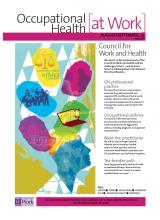August/September 2015 (vol. 12/2)
ContentsFeaturesNewsLegal
NewsResearch DigestResearch PlusCPD
Research Plus
Work-to-family conflict
A study of nursing care workers revealed an increased risk of cardiovascular events in workers experiencing work–family conflict. However, the raised risk was associated with experiences at work interfering with family life (work-to-family conflict) rather than family life interfering with work (family-to-work conflict). The study included 1,524 care workers (92% female) from 30 US nursing homes. It measured socio-demographic and work factors, work–family conflict, cardiometabolic risk score (CRS), family supportive supervisor behaviours (FSSB) and sleep duration. Work-to-family conflict was significantly associated with higher CRS; however, there was no association with either family-to-work conflict or FSSB and CRS. Lower employment status – ie being a nursing assistant rather than a nurse – was associated with a raised CRS, whereas being married or having young children at home was associated with a lower CRS. The association between work-to-family conflict and increased CRS was more pronounced in younger workers. Family-to-work conflict was significantly associated with shorter sleep duration.
Occupational Health at Work August/September 2015 (vol. 12/2) pp39



